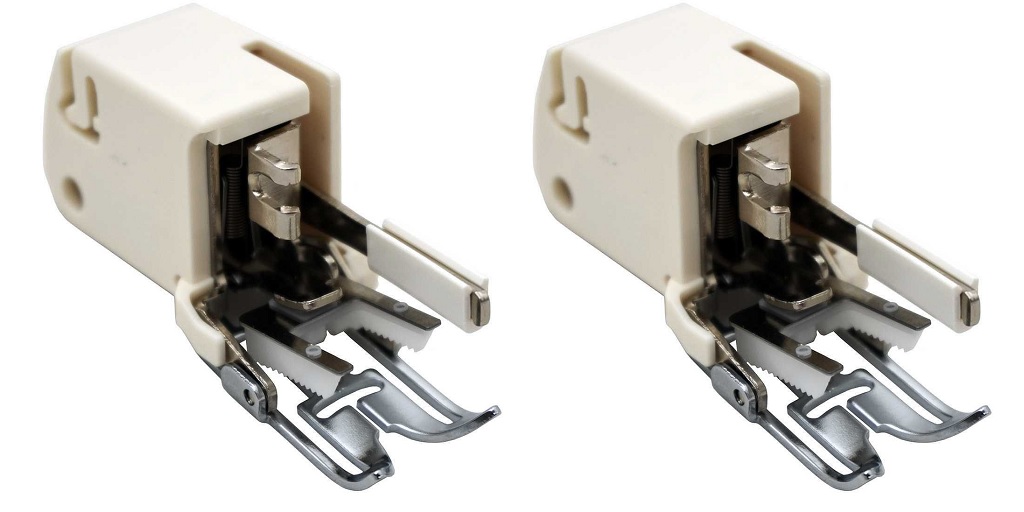Using a sewing machine opens up a world of creative possibilities, and understanding how to use presser feet is essential for achieving professional results. Each presser foot is designed for specific tasks, making it easier to create beautiful seams and embellishments.
There are various types of presser feet and their uses, and knowing which one to use is essential for beginners to get the most out of their sewing machines.
Understanding Presser Feet
Presser feet are attachments on a sewing machine that hold fabric in place while it’s being stitched. They press down on the fabric, sandwiching it between the foot and the feed dogs, which move the fabric through the machine. This mechanism ensures that the fabric is fed evenly and helps prevent shifting during sewing.
Types of Presser Feet
Presser feet can be broadly categorized into utility and decorative feet. Utility Feet are designed for basic sewing techniques and are essential for most sewing projects. Decorative Feet are used for embellishing your projects, adding unique touches to your creations.
Common Utility Presser Feet
- All-Purpose Foot
This is the most common foot and typically comes standard with your sewing machine. It’s versatile enough for most sewing tasks, making it a go-to for beginners.
- Zipper Foot
The zipper foot is designed to help you sew zippers or any time you need to stitch close to the edge of your fabric. It comes in different styles, allowing you to choose which side to sew from. Always check the needle placement when using this foot to avoid breaking your needle.
- Buttonhole Foot
This foot is specifically designed for sewing buttonholes. There are two types: the 4-step buttonhole and the one-step buttonhole foot. Both can create standard or corded buttonholes. Make sure to follow your machine’s manual for proper usage.
- Quarter-Inch Foot
Perfect for quilting and projects requiring precise quarter-inch seams, the edge of this foot acts as a guide, helping you achieve accurate measurements.
- Walking Foot
This foot is an excellent investment for quilters, as it feeds fabric layers evenly from both the top and bottom, preventing shifting. It’s particularly useful when working with multiple layers or tricky fabrics.
- Blind Hem Foot
This foot is designed for creating invisible hems. Pair it with a blind hem stitch for a clean finish that is less visible on the front of the fabric.
Specialized Utility Feet
- Overcast Foot
Used with an overcast stitch, this foot is perfect for finishing edges, particularly in garment sewing. It helps prevent fraying and gives a polished look to your seams.
- Teflon Foot
Ideal for sewing tricky materials like leather or vinyl, the Teflon foot allows for smoother movement over these fabrics, minimizing sticking or snagging.
- Free Motion Quilting Foot
This foot allows for free motion sewing, letting you guide the fabric where you want it to go. It’s perfect for quilting and darning, requiring you to lower the feed dogs for optimal control.
Decorative Presser Feet
- Monogram Foot
This foot is designed for decorative stitching and often includes a groove for thicker threads. It allows for more freedom of movement while sewing.
- Ruffler Foot
For those who love gathering fabric, the ruffler foot automatically folds and gathers fabric as you sew, saving you time and effort compared to doing it by hand.
- Beading and Cording Foot
These specialized feet are used for attaching beads, cording, or ribbons to your fabric. They simplify the process, allowing for professional-looking embellishments.
Know Which Presser Feet is Ideal for Your Projects
When you know what kind of project you want to do, knowing which presser feet you need is easy. These different types of feet are suitable for different types of projects and purposes, so you can open up new possibilities for your sewing projects.
For more information about Baby Lock Sewing Machine and Multi Needle Embroidery Machine please visit:- Premier Stitching DBA Sew Vac City
